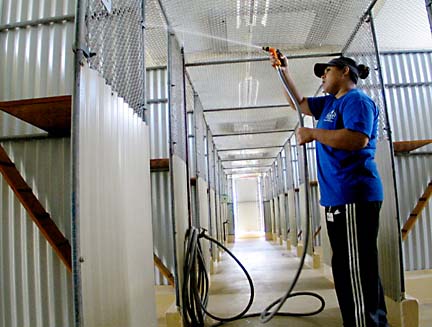
Shirlene Tamayori and kennel supervisor Larry Dixon oversee the operations of the new kennels that opened in March at the Halawa State Quarantine Station. The kennels are available only to active duty military, reservists, retirees and Department of Defense employees.
Kennel initiative gives
isle military room for SpotThe program provides for families
with pets as they await housing
For many years, one of the biggest complaints of military personnel transferred to Hawaii was the state quarantine law that kept their pets locked up in Halawa Valley.
Lawmakers amended the law several years ago under pressure from local military leaders and others, reducing the stay in the pet quarantine station to five days or less from 120 days, if certain requirements were met.
But that posed another problem, said Shirlene Tamayori, Army program analyst with the community recreation division.
"It meant that some families didn't have a place to house their pets while they waited for housing," Tamayori said. "Before the changes they had at least 120 days, but it was expensive."
Some pet owners tried to sneak their pets into their hotel rooms, but when they got caught they were evicted.
Last year, the Hawaii Army Family Initiative looked into the possibility of building animal kennels at Schofield Barracks in anticipation of the change in the animal quarantine law, which took effect last June.
"The delegates to the meeting felt that the military needed an affordable facility," Tamayori said, "for their pets of military families who were waiting for housing, had to go on temporary duty assignments, emergency leave or short-term deployments.
Annela DeCosta hoses down one of the 36 kennels at the cattery run by the military in Halawa.
"They explored the possibility of building one at Schofield, but there were no funds and it would have taken a long time to get new funding approved."
So Col. David Anderson, U.S. Army Hawaii Garrison commander, directed his staff to explore the possibility of leasing kennels from the state quarantine facilities in Halawa.
In March, the military's Morale, Welfare and Recreation agency opened 32 kennels for dogs and 36 for cats. It made the facility available not only to the Army but all military members, Department of Defense civilian employees and military retirees. The military pays the state $3,000 a month on its annual lease.
State law requires that these imported pets complete a 120-day confinement at Halawa. However, if specific pre-arrival and post-arrival requirements are met, animals may qualify for a 30-day quarantine or the five-day-or-less quarantine that became effective on June 30, 2003.
The 120-day quarantine program costs $1,080 per pet. If a pet has to be quarantined for 30 days it drops to $655, and five-day-or-less is $224 per pet. There are no discounts for multiple pets. The U.S. Department of Defense will reimburse active duty military members with dogs or cats at $550 per family for quarantine expenses.
Larry Dixon, the kennel director, who heads a staff of two, said "priority is given to active duty military people first. But I don't think that will cause any problems since we could expand if we had to."
The military was required to erect a chain-link fence to separate its 68 kennels from those maintained by the state. The cost of housing a dog amounts to $12 a day and $10 a day for cats.
"That's a bargain," said Tamayori, "since a survey showed that kennel cost begins at $15 a day."
But those kennels are small because most of them are run by veterinarians, said Dixon, a retired federal firefighter.
Both the military dog and cat kennels are large enough to accommodate two animals, so a military family can house a second pet, paying only half price for each animal.
Before accepting any pet for boarding, Dixon said, officials must make sure the animal has a current health certificate and proper documentation of vaccinations. All shots must be current and within a year.
Dixon said pet owners are encouraged to bring their pet's favorite toys or bedding. The kennels in the cattery are a little smaller than the dog kennels, which measure 6 feet by 16 feet. However, the cats' kennels are equipped with 3-foot-long cat ladders leading to small perches.
By next year, Dixon said he hopes to have a "paperless" operation and be able to allow his patrons to register and pay for the boarding cost online. He also plans to replace his temporary office.
"But in the end what we offer," Tamayori said, "is a safe and clean environment with quality service."
With so many Schofield Barracks soldiers being deployed to Iraq and Afghanistan for at least a year, Dixon said his office has already gotten inquiries on the services he offers.
"However," Dixon added, "if they are going to be gone for a year, they are probably better off sending their pet home to live with family members or friends, even if it's on the mainland, since housing them here will be really expensive."
The other alternative is the Humane Society's Pets of Patriots program, which its coordinator, Keli Nitahara, said matches community volunteers with deploying military personnel. The deploying military person is responsible for all financial costs, including food and veterinarian care. For more information, call Nitahara at 946-2187, ext. 217.

